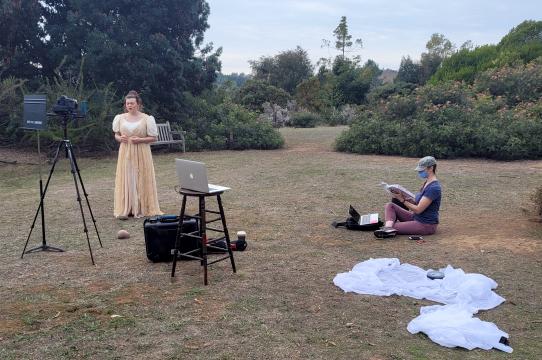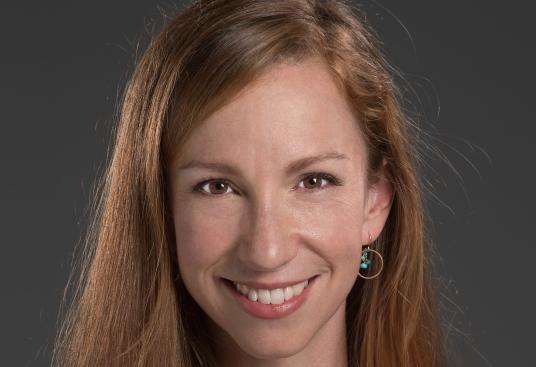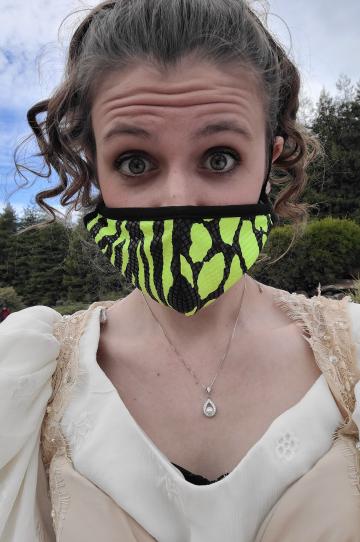I am so grateful to have the privilege of producing opera with these students during a time when so much of the arts world has been paused.
On behalf of the many students, designers, staff, faculty, and Arts Division personnel who have contributed to this project, I’m very happy to welcome you to Donizetti’s L’elisir d’amore! Needless to say, this film production is much different from the staged production I envisioned when my colleagues and I selected this opera two years ago.
 The roles were cast in the fall of 2019 with plans for four live performances in Spring 2020. During winter quarter of 2020, the singers rehearsed their music and coached diction with Mickey McGushin, while AAU’s Je Gia designed their period costumes. In early March, UC Santa Cruz, along with the rest of the nation, pivoted to remote learning, and we used our spring quarter to rehearse recitative, develop characters, and work with the libretto in Italian and in translation. At that point, the cast, crew, and I considered the performances postponed until Fall.
The roles were cast in the fall of 2019 with plans for four live performances in Spring 2020. During winter quarter of 2020, the singers rehearsed their music and coached diction with Mickey McGushin, while AAU’s Je Gia designed their period costumes. In early March, UC Santa Cruz, along with the rest of the nation, pivoted to remote learning, and we used our spring quarter to rehearse recitative, develop characters, and work with the libretto in Italian and in translation. At that point, the cast, crew, and I considered the performances postponed until Fall.
What resulted was a tremendous group effort between singers, orchestra, conductor, directors, and designers—as any opera is—but this time collaborating from 50 separate households.
When it became clear that we wouldn’t be together onstage for quite some time, I began having many long brainstorming conversations with colleagues (Emily Sinclair, Bruce Kiesling, Dave Dunning, Brian Staufenbiel, David Murakami) about what potential form a remotely produced opera film could take. David Murakami’s ingenious visual concept and Bruce Kiesling’s architecture of a remote recording process paved the way for us to move forward with a remote Elixir. What resulted was a tremendous group effort between singers, orchestra, conductor, directors, and designers—as any opera is—but this time collaborating from 50 separate households.
I am so grateful to have the privilege of producing opera with these students during a time when so much of the arts world has been paused. I’m grateful to our base of donors for making it possible to move through this time knowing there is a future for opera and the arts at UCSC on the other side of this; and to Alice Gallup and Dard Neuman of the UCSC Music Department, for allocating CARES Act funding to provide recording and video production equipment for the students.
Our students have achieved amazing things and experienced so much growth during this period of adversity. I’m so grateful to them for being open to something different and difficult as we learned how to collaborate while separated. I’m grateful, also, to the two Adinas in this production who (with all safety protocols observed) were able to film their parts in person—mostly in one take—on one long, challenging, fun, and at times frigidly cold December day.
I can’t wait to hear my students sing again in person.
I can’t wait to hear my students sing again in person; I can’t wait to get back into rehearsals with them, helping them learn to tell stories that move you or make you laugh; and I can’t wait to sit in the audience with you and applaud them. In the meantime, though, this project has been a bridge. It was a crash course for all of us, not only in gaining fluency with the technologies and methods used to make this, but also in what is possible with innovation and determination. My children keep talking about how funny the characters are, singing bits and pieces of these beautiful melodies, and asking to watch it again—they are pretty sure you will love it, too.



